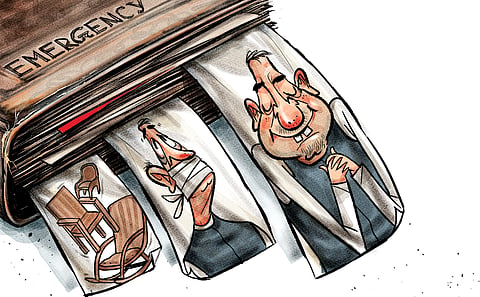Three lessons for today from Emergency 1975
Come June 25, India will be observing the 50th anniversary of a murderous attack on its democracy. Announcing the cabinet decision last July, Home Minister Amit Shah had said that, as a reminder of how Indira Gandhi had thrown lakhs of people behind bars for no fault of their own and the way media’s voice was muzzled, the government had decided to observe every June 25 as ‘Samvidhaan Hatya Diwas’. He further stated, “This day will commemorate the massive contributions of all those who endured the inhuman pains of the 1975 Emergency.”
On March 21, 1977, India Gandhi decided to withdraw the Emergency after the results of that year’s Lok Sabha elections were announced. While the electoral verdict was the last nail on the coffin, many other factors hugely contributed to compel Mrs Gandhi to backtrack. One of them was the satyagraha movement started mainly by the RSS and Sangh-inspired organisations.
The RSS’s role in mobilising the satyagraha movement was appreciated by many, including by some who were diehard opponents of RSS ideology. Achyutrao Patwardhan, a noted socialist leader, is on record saying, “I am pleased to learn that the volunteers of the RSS, as well as any other group of political resistance, were willing to openly collaborate and support those who opposed Emergency and are able to work with enthusiasm and integrity, against the diabolical regime that resorts to blatant repression and lies.”
Deeply impressed by the satyagrahis’ valour in leading the movement in the face of police atrocities and brutality, CPI(M) leader A K Gopalan observed, “There must be some high ideal giving them indomitable courage for such a heroic act and sacrifice.” (June 9, 1979, Indian Express).
The history of the Emergency, conducted in a draconian manner that independent India has never witnessed, has three key lessons that all Indians must learn. Firstly, the dynasty-driven political parties pose a serious threat to democracy. Remember, most dynastic parties emerged on the political horizon of India around the 1970s. It was in that decade that many dynasties tightened their stranglehold on otherwise ideology-driven parties and converted them into family businesses.
There is reason to believe that Indira Gandhi’s brand of politics inspired them. By the late 1960s, Indira Gandhi realised that she was almost totally isolated in her party. Deeply disturbed by this, instead of re-building bridges, she chose to create her own party, only to realise that she could completely rely only on her close family members—especially her younger son Sanjay Gandhi. In the mid-1970s, with the opposition parties coming together and sharpening their attack, media roundly criticising her and anti-corruption youth movements in Gujarat and Bihar gaining momentum, a sense of insecurity overwhelmed Indira Gandhi’s mind. Alone at the top and suspicious of her colleagues in Congress—although it was completely under her control—she found dependable support in only in Sanjay. Her dependence was so complete that although she rescinded Sanjay’s directives on June 25, 1975 to cut power supply to media houses and keep high court chambers under lock, she couldn’t directly confront her son.
Over the years, the Indira-Sanjay duo became a model to orchestrate son-rises in different political parties. Remember, it is the post-Emergency era that has witnessed the emergence of younger generations among the Thackerays, Stalins, Abdullahs and the Yadavs of UP and Bihar coming forward to take control of the parties earlier helmed by their fathers. It would not be an exaggeration to suggest that the Emergency emboldened many to convert their parties into family fiefdoms. Dynastic parties do not just lack in ideology-based policy perspectives, but also promote birth-based discrimination, something that our Constitution rejects lock, stock and barrel. Hence, the first lesson of Emergency is that dynastic parties are detrimental to democracy.
Why could none in the Congress come forward to oppose Indira Gandhi? By the mid-1970s, the party had become bereft of even the veneer of ideology. The leadership was almost completely encircled by sycophants. Internal democracy within the Congress had become a thing of the past. As a consequence, none in the party had a semblance of courage to question Indira Gandhi, much less oppose her decision to impose Emergency.
In the larger context of democratic reforms, political party reform merits greater attention. In many states like Maharashtra, charities and public trusts are disallowed from having two or more blood relations occupying office simultaneously. A similar provision in the rules and regulations governing the establishment of political parties would go a long way in ending dynastic politics. Obviously then, with party organisational leadership itself throwing internal democracy to the dustbin, the need to deliberate upon a slew of party reforms becomes the second important lesson of the Emergency.
The third learning is about the most sordid ‘safe play’ approach of thinkers, creative writers and litterateurs. Except for a few writers and scholars such as Dharmaveer Bharati, Kamaleshwar, Durgabai Bhagwat and Vishnu Pandya, most writers, poets and playwrights chose to remain silent and failed to rise to the expectations of the people. Sadly, journalist Khushwant Singh openly endorsed Emergency rule; some other journalists were also found wanting on this front. Former Deputy Prime Minister Lal Krishna Advani had wryly commented that while the government wanted media persons to simply bend a little, the latter chose to crawl. Many of those who are wearing ‘Freedom of expression’ badges on their sleeves today were silent during the Emergency and didn’t join the satyagraha of those days.
The history of the 21 months of Emergency is a stark reminder of how some people manning democratic institutions—like the judiciary and the press—are ready to compromise when pressured. The third lesson, therefore, is that people of integrity who are committed to the basics of democracy and are ready to fight for it—although in short supply—are the true saviours of democracy than those who give lip service to the ideal.
Vinay Sahasrabuddhe | Senior BJP leader
(vinays57@gmail.com)
(Views are personal)

